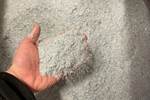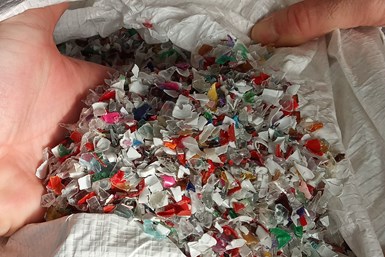AOC presents complete range of rPET-based resin formulations
Czech Republic facility takes post-consumer waste and converts it into high-quality formulations, such as the Synolite 4600 and 1112-G series, for composites manufacturing.
AOC (Schaffhausen, Switzerland) announces the manufacture of a full range of high-quality recycled PET (rPET)-based resin formulations at its Ústí nad Labem site located in Czech Republic. The rPET used for making these resins, mostly coming from post-consumer waste, is ground into small chunks and pellets, which are then processed into liquid intermediates and subsequently converted into various formulations in line with customer specifications. According to plant manager Petr Vanek, this enables customers to make parts in the right shape with optimal strength, durability and with a low eco-footprint.
“As a large portion of the rPET raw material is originating from post-consumer sources, contamination with polypropylene bottle caps, paper and metal can be significant,” explains Vanek. “Obviously, these contaminants have to be removed for obtaining the desired product property profile and for ensuring quality consistency.”
In recent years, AOC has made significant investments in the Ústí plant, including the installation of filtration systems capable of separating the liquid intermediate from non-dissolvable materials. This enables the manufacture of high-quality intermediates, which are the basis for products used in a broad range of markets and applications. The plant also manufactures green formulations based on rPET. With current modifications and continuous process development, the Ústí team aims to set up AOC for long-term growth.
“We anticipate that the rPET-based formulations are going to be one of the larger product families made in our plant,” adds Vanek. “For our customers, using rPET-based products makes a lot of sense, as these bring a great end-use performance and a simultaneous reduction of eco-footprint.”
AOC highlights two examples from its broad rPET-based product range. The Synolite 4600 series, for example, has received certification from Lloyd’s Register for use in marine applications. They are available in resin transfer molding (RTM)/infusion and hand layup versions. The MgO-thickenable Palapreg P 40-01 formulation is ideally suited for sheet and bulk molding compound (SMC and BMC) and is compatible with fillers and low-shrinkage additives.
The Synolite 1112-G series is combinable with CaCO3 fillers, yielding parts with predictable dimensions in sanitary and casting applications. For continuous panels, filament winding and pultrusion, multiple products are available from the Palatal P 42 series that feature optimal glass fiber compatibility and enable the manufacture of parts with high strength and stiffness.
Related Content
-
Natural fiber composites: Growing to fit sustainability needs
Led by global and industry-wide sustainability goals, commercial interest in flax and hemp fiber-reinforced composites grows into higher-performance, higher-volume applications.
-
The potential for thermoplastic composite nacelles
Collins Aerospace draws on global team, decades of experience to demonstrate large, curved AFP and welded structures for the next generation of aircraft.
-
Combining multifunctional thermoplastic composites, additive manufacturing for next-gen airframe structures
The DOMMINIO project combines AFP with 3D printed gyroid cores, embedded SHM sensors and smart materials for induction-driven disassembly of parts at end of life.

















